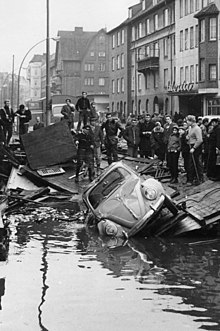State election in Hamburg 1961
On November 12, 1961 the election for the 5th electoral term of the citizenship of the Free and Hanseatic City of Hamburg ( citizenship election ) took place. There were choosing 120 deputies sent to the citizenry.
Election result and distribution of seats
The result of the election for citizenship in 1961 was:
| Political party | be right | in percent | Seats |
|---|---|---|---|
| SPD | 567,793 | 57.4% | 72 |
| CDU | 287,619 | 29.1% | 36 |
| FDP | 95,061 | 9.6% | 12 |
| DFU | 28,511 | 2.9% | - |
| DRP | 9,045 | 0.9% | - |
| DG | 784 | 0.1% | - |
government
In 1961, the First Mayor Paul Nevermann was confirmed in his office. Due to a political scandal in connection with the visit of Queen Elizabeth II , he had to resign on June 9, 1965. His successor was Herbert Weichmann , who also campaigned for the SPD for the 6th electoral term . The government was formed from a senate made up of the SPD and FDP. The SPD could have governed alone, but continued its traditional work with the liberals.
→ See also: Senate Nevermann II and Senate Weichmann I.
Main issues during the 5th electoral term
During the electoral term, the catastrophic storm surge in 1962 also raged over Hamburg on the German North Sea coast . On the night of February 16-17, 1962, the water flooded almost one sixth of the Hamburg state area (120 km²). The then police senator (today interior senator) Helmut Schmidt took over the crisis management and was able to distinguish himself nationwide.
A second supraregional issue was the Spiegel affair , which not only preoccupied the citizens, but above all the Bundestag. This political scandal was the trigger for the introduction of a liberal press law. In 1965 the citizens passed the law. The factions of the CDU and FDP did not see freedom of the press in jeopardy, but bowed to the general mood in politics, journalists' associations and the public. The FDP politician Alfred Frankenfeld , together with the Interior Senator Helmut Schmidt, was the driving force behind the implementation of the proposed law.
In transport policy, the idea of a joint transport association for Hamburg was born . Due to the fragmentation of the companies with their own means of transport (including S-Bahn, U-Bahn, bus lines, ferry boats) it was difficult to work out an overall concept for Hamburg. The creative director Max Mroß floated a covenant of transport operators, who were working together, but still received their Eigenständigkeiten. One of the main possibilities of this association was a uniform tariff and thus a relief for the "transport cases" (passengers). From a macroeconomic point of view, the merger should make it possible to manage modes of transport rationally in order to avoid duplicate offers. The Hamburg Transport Association (HVV), which was decided by the citizenship in 1965 and approved by the companies involved (e.g. Deutsche Bahn ), also received worldwide attention. In the New York Times of June 19, 1971, it was stated, for example: "In their efforts to create attractive mass transport, most city administrations are looking at the city-state of Hamburg, West Germany's largest metropolitan area, which has successfully operated the world's first public transport system since 1966." .
There was a Parliamentary Committee of Inquiry (PUA) within the 5th electoral term .
- The content of the investigation was the death of prisoner on remand Ernst Haase. The American citizen died on June 30, 1964 after being mistreated while in custody. On April 22, 1966, another committee of inquiry was set up on the subject in the sixth electoral term .
See also
source
- Hamburg citizenship: The Hamburg citizenship 1946–1971. Reconstruction and new construction . illustrated by Erich Lüth , Verlag Conrad Kayser, Hamburg 1971
Individual evidence
- ^ Elections in Hamburg. The general election from 1946 to 2001 Spiegel Online
- ^ Citizenship elections Hamburg state votes elections in Germany
- ^ The Hamburg Citizenship, p. 124.
